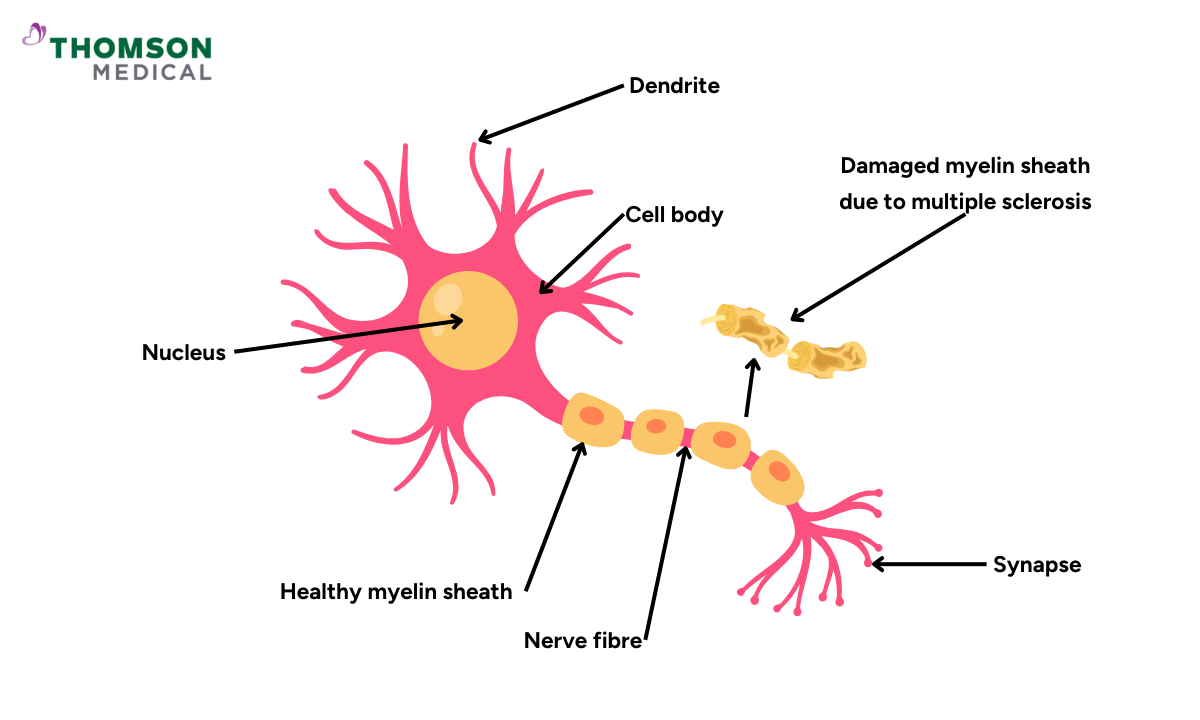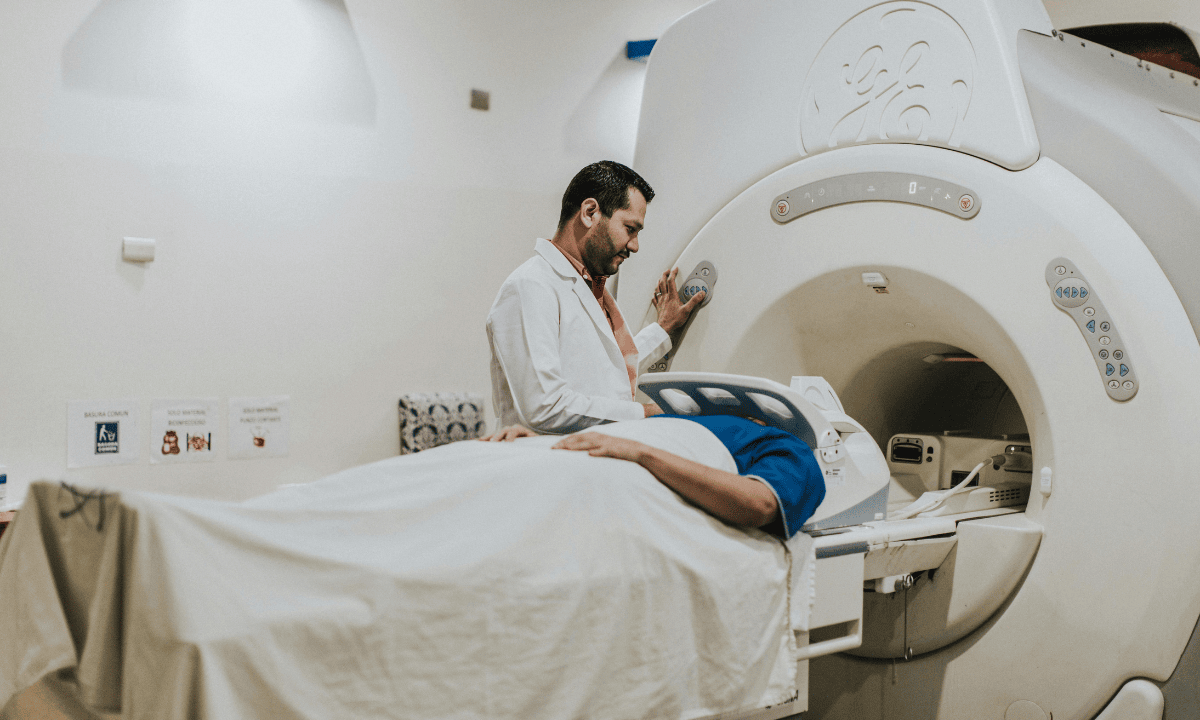MRI scans for multiple sclerosis (MS)
A magnetic resonance imaging (MRI) scan is a medical imaging test that your healthcare provider will use to create detailed images of the brain, optic nerves, and spinal cord if you've been diagnosed with multiple sclerosis. Unlike an X-ray or CT scan, an MRI uses a strong magnetic field and radio waves instead of radiation.
MS is a neurological disease in which the immune system attacks the protective myelin coating around nerve fibres, causing lesions or damage to the brain, optic nerves, and spinal cord. MRI is an important tool for diagnosing these lesions, tracking the progression of the disease and assessing how well treatments are working.
How does MS appear on an MRI scan?

During an MRI scan, MS usually appears as lesions or plaques—these are areas where the myelin sheath (the protective fatty covering around nerve fibres) has been damaged. These fats naturally repel water and help keep nerve signals transmitted quickly and efficiently along the nerve cells.
When MS damages the myelin, this fatty layer is stripped away, so the exposed area holds more water than normal, which alters how it looks on MRI images. Depending on the type of MRI scan used, these changes show up as either bright white spots (called hyperintense lesions) or dark areas (known as hypointense lesions or “black holes”).
MS lesions are often oval- or flame-shaped and can appear in both white matter (which contains nerve fibres) and grey matter (which contains nerve cell bodies) in the brain and spinal cord. Over time, as inflammation subsides, these lesions can harden into scar tissue (plaques).
If you would like more information about MRI scans for multiple sclerosis, request a consultation with Thomson Medical. Our specialists can provide you with further explanation about this procedure, including the advantages and disadvantages you should be aware of.
Types of multiple sclerosis
There are four types of MS, based on the progression of symptoms and frequency of relapses. These include:
Clinically Isolated Syndrome (CIS)
This phase is when people have their first episode of symptoms (such as vision problems) that may indicate MS but don't yet meet the criteria for having MS.
Your healthcare provider will then do an initial MRI scan to look at the number of brain or spinal cord lesions, which can help assess your risk of having another attack in the future and work out your risk of developing multiple sclerosis (MS).
Relapsing-Remitting MS (RRMS)
This kind of condition is the most common type of MS, and it is characterised by periods of new symptoms—or relapses—that develop over days or weeks.
These relapses are then followed by periods of partial or complete recovery (remission) that can last for months or years.
Secondary Progressive MS (SPMS)
People with relapsing-remitting multiple sclerosis may eventually develop a steady progression of symptoms.
This progression can occur with or without periods of remission and occurs within 10-40 years of the initial development of the disease. If the symptoms worsen, the outcome usually includes problems with mobility and walking.
Primary Progressive MS (PPMS)
In some cases, MS symptoms may start off slowly and gradually worsen over time without any periods of relapses or remission.
What can a multiple sclerosis MRI scan tell us?
MRI scans can help your healthcare provider see when lesions are new and growing and how much harm they may be doing to the brain or the spinal cord. It can also provide valuable information about the MS condition, such as
Assess lesion location and number
MRI shows the number and location of MS lesions in the brain and spinal cord, which can indicate the disease's severity.
Detecting active or inactive lesions
Using contrast-enhanced MRI, your healthcare provider can distinguish active lesions (which take up the dye and appear brighter) from older, inactive lesions.
It can also tell whether MS is relapsing or stable without activity.
Assessment of brain atrophy
MRI can show shrinkage or atrophy of the brain, which may indicate long-term damage from MS and is associated with disability progression.
Tracking disease progression
MRI scans can help your doctor track changes in the disease over time, showing whether new lesions are forming, looking for signs of activity, or whether brain atrophy (shrinkage) is occurring.
This information helps to assess current disease activity and guide treatment decisions.
Rule out other condition
MRI helps to rule out other conditions that may mimic MS by identifying patterns of lesions that are typical of other diseases.
Early diagnosis of multiple sclerosis can significantly improve treatment outcomes. Request an appointment with us to find out if a multiple sclerosis MRI scan is right for you.
Preparing for an MRI scan

Preparing for an MRI is relatively simple, and your healthcare provider will give you instructions to help you prepare. This imaging test is performed by a radiology technologist, a professional who is trained and certified to operate the MRI equipment.
Here are some general guidelines to help you prepare:
Clothing
Before the scan, you may be asked to change into a hospital gown and remove any jewellery, dentures, watches, or other metal objects that might interfere during the procedure.
Metal objects
Inform the technologist if you have any metal implants, pacemakers or other medical devices, as they can interfere with the MRI scan.
Medications
Bring a list of any medications you are taking, as some may need to be temporarily stopped before the procedure.
Contrast dye
If your doctor orders a contrast-enhanced MRI, you may need to be injected with a contrast dye (gadolinium) to improve the visibility of certain structures.
Pregnancy
If you are pregnant or think you might be, tell your doctor or technologist before the scan.
What to expect during the MRI scan
Following the preparation stage above, the procedure will begin and usually lasts 30 to 60 minutes. During the scan, you can expect the following:
Before the scan, if a contrast dye is needed, it will be injected into a vein, usually in your arm.
You will be asked to lie down on a table that slides into a large, tubular machine.
When the scan starts, the MRI machine will make loud tapping and clicking noises. You'll be given earplugs or headphones to wear before the procedure to protect your hearing.
It's important to stay still during the scan to ensure clear images. You may be asked to hold your breath for a short time.
The MRI radiologist will be in another room, but you can use the intercom to contact them if there are any issues.
If you are anxious about being in enclosed spaces (claustrophobia), talk to your healthcare provider. You may be given a sedative to help you relax during the scan.
If you didn't have a sedative for the MRI scan, you won't need a recovery period. You can go home and resume your normal activities. However, if you've had a sedative for the scan, you'll need to recover from its effects before you can safely go home.
Price of an MRI scan for MS in Singapore
The cost of a multiple sclerosis MRI scan in Singapore depends on several factors. These include whether or not contrast is used, which part of the body is being scanned, and whether it is done in a public or private facility.
For Singaporeans, the MOH provides subsidies of up to 70% for patients at public specialist outpatient clinics. Additional subsidies of up to 50% and 25% are available for Pioneer and Merdeka Generation seniors, respectively.
In addition to the subsidies, patients can use their MediSave to offset the balance of up to $300 per year for outpatient diagnostic scans, including MRI scans. Seniors aged 60 and over can withdraw an additional $300 per year from MediSave for MRI scans under the Flexi-MediSave scheme.
The information provided above is intended for general reference only. To learn more about subsidies for MRI scans, please refer to Singapore’s MOH website. Request an appointment with our specialists at Thomson Medical today for a detailed price breakdown and a personalised care plan.
Risks of multiple sclerosis MRI scan
MRI scans are generally safe, but there are some potential risks you need to be aware of:
Loud noise, which can be uncomfortable for some people.
People with claustrophobia may feel anxious inside the enclosed MRI scanner.
Rarely, people may have an allergic reaction to the contrast dye used during the scan. Symptoms may include nausea, rashes, flushed skin, and shortness of breath.
People with metal implants, pacemakers, or other devices may need special precautions or can't have an MRI.
Patients may feel nervous or stressed while lying still in the MRI machine for a long time.
FAQ
Does an MRI show multiple sclerosis?
Yes, MRI is the primary imaging method for detecting MS. It offers detailed images that reveal the presence, location, active inflammation, and the extent of lesions in both the brain and spinal cord.
What are the criteria for MRI for MS?
MRI criteria for MS diagnosis typically include:
Evidence of lesions in multiple areas of the central nervous system (brain, spinal cord, optic nerves)
Lesions that have developed at different times (temporal dissemination)
Characteristic appearance and location of lesions typical of MS
Absence of alternative explanations for the lesions
Healthcare providers use these criteria alongside clinical symptoms and other tests to make an accurate diagnosis.
How do you diagnose multiple sclerosis?
Multiple sclerosis is diagnosed through a combination of:
Medical history and neurological examination
Brain and spinal cord imaging
Lumbar puncture (spinal tap) to analyse cerebrospinal fluid
Evoked potentials (testing how well electrical signals travel along nerves).
Blood tests to rule out other conditions with similar symptoms
No single test can diagnose MS definitively. Healthcare providers use the McDonald Criteria, which combines clinical and MRI findings to establish a diagnosis.
What are four types of multiple sclerosis?
The four main types of multiple sclerosis are:
Clinically Isolated Syndrome (CIS)
The first episode of MS-like symptoms lasting at least 24 hours, which may or may not develop into MS.
Relapsing-Remitting MS (RRMS)
The most common form is characterised by clearly defined relapses (episodes of new or worsening symptoms) followed by periods of partial or complete recovery.
Secondary Progressive MS (SPMS)
Often follows an initial period of RRMS, with symptoms steadily worsening over time with or without relapses.
Primary Progressive MS (PPMS)
The condition is characterised by gradually worsening symptoms from the onset of the disease with no early relapses or remissions.
What is the first indicator of MS?
The first indicator of MS varies from person to person, but common initial symptoms include:
Vision problems, such as blurred vision or partial vision loss (optic neuritis)
Numbness or tingling in limbs
Muscle weakness or spasms
Balance problems or dizziness
Fatigue
Cognitive difficulties
These clinical signs usually appear during a Clinically Isolated Syndrome (CIS), which may be the first presentation of MS. An MRI scan during this phase can help assess the risk of developing MS by showing the number and location of lesions.
The information provided is intended for general guidance only and should not be considered medical advice. For personalised recommendations based on your medical conditions, request an appointment with Thomson Medical.
For more information, contact us:
Thomson Specialists Paragon (Health Screening)
- Mon - Fri: 8.30am - 5.30pm
- Sat: 8.30am - 12.30pm
Call: 6735 0300
Request a Health Screening